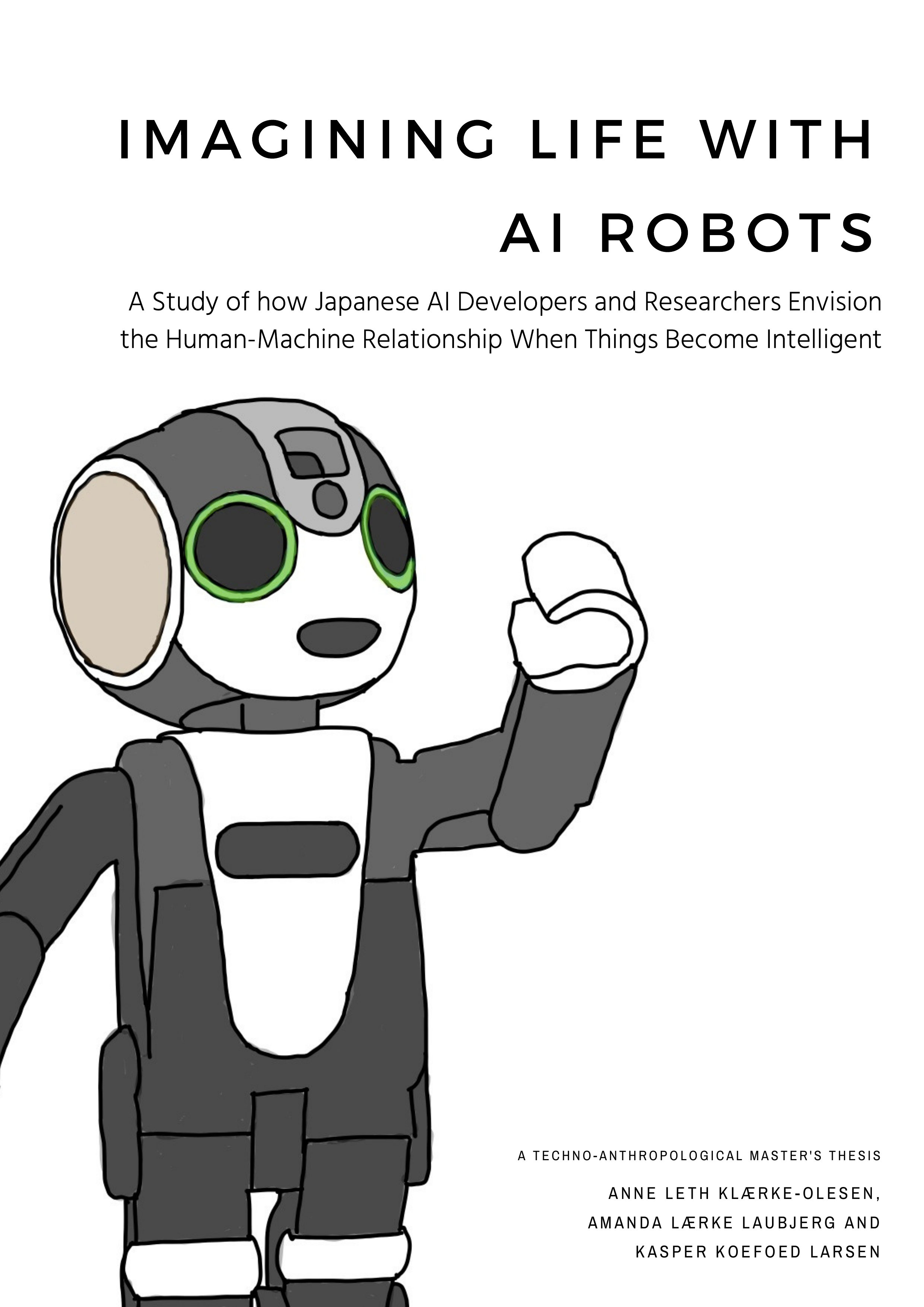
Imagining Life with AI Robots: A Study of how Japanese AI Developers and Researchers Envision the Human-Machine Relationship When Things Become Intelligent
Translated title
Imagining Life with AI Robots
Term
4. term
Education
Publication year
2018
Submitted on
2018-06-01
Pages
89
Abstract
Dette projekt undersøger på baggrund af feltarbejde udført i Tokyo, udviklingen af robotter med kunstig intelligens (KI) i Japan og hvilke visioner der indgår heri. Der er allerede udført omfattende forskning inden for de fysiske og æstetiske perspektiver af robotudvikling i Japan af vestlige forskere. Dette projekt bidrager derimod med indsigt i de perspektiver der opstår når robotter bliver tildelt følelsesmæssig intelligens. Vi belyser dette ved at undersøge hvordan og hvorfor japanske virksomheder og vidensinstitutter der arbejder med KI, udvikler KI robotter som de gør, samt hvilke visioner for de fremtidige forhold mellem mennesker og maskiner der gør sig gældende. Denne udvikling i Japan bliver ofte fremstillet som værende skør i vestlige medier, men vores analyse udfolder, at der er seriøse og velovervejede refleksioner der ligger bag ved udviklingen af KI robotter, der skal leve sammen med mennesker i fremtiden. Projektet trækker på Sheila Jasanoff og hendes begreb sociotechnical imaginaries og anvender dette til at belyse hvordan KI robotter er tiltænkt som partnere. Vi udfolder ydermere dette ved at belyse hvordan antagelser og forestillinger omkring japanske forbrugere er medvirkende til at forme imaginariet omkring KI robotter som partnere. Projektet belyser ligeledes hvordan dette imaginary er konstitueret gennem materialiseringen af personlighed, køn, humor og kærlighed i KI robotter. På baggrund heraf diskuterer vi hvad KI robotter som partnere bliver for en entitet og hvordan dette imaginary udfordrer vores måder at tænke på menneske-maskine relationer. Vores studie konkluderer at det er nødvendigt at overveje vigtigheden af det emotionelle liv mennesker har i vores relation til ting, og udfolder gennem en inddragelse af Haraway, at robotter som partnere ikke er et problemfrit imaginary og at det rejser spørgsmål om menneske-maskine relationer fordi KI robotterne bliver til gennem interaktionen og gennem de forestillinger udviklerne har. Dertil konkluderer vores studie at robotter som partnere er en måde at adressere komplekse entiteter og hvordan vi kan leve med maskiner i fremtiden, når de er intelligente.
This project investigates, on the basis of fieldwork carried out in Tokyo, the visions and development of robots with artificial intelligence (AI) in Japan. Investigating the physical perspectives of robot development in Japan has been done extensively by Western scholars, but this project contributes insights to the perspectives which arise when robots are given emotional intelligence. We do this by investigating how and why the Japanese AI companies and knowledge institutes develop AI robots as they do and with what visions for the future relationship between humans and machines. This development in Japan is often portrayed as “crazy” in the West, but our study shows that there are serious and well considered reflections and considerations that underlie the development of the AI robots which are to live together with humans in the future. The project draws on Sheila Jasanoff and her concept of sociotechnical imaginaries and uses this to show how AI robots are envisioned as partners. We further unfold this by showing how assumptions and conceptions of Japanese consumers take part in shaping the imaginary of AI robots as partners. Subsequently, the project illuminates how this imaginary is constituted through the materialisation of personality, gender, humour and love in AI robots. On the basis hereof, we discuss what AI robots as partners become and how this imaginary challenges our ways of thinking about human-machine relations. The study concludes that it is necessary to consider the importance of emotional life humans have in our relation to things, and unfolds by drawing on Haraway, that the imaginary of having AI robots as partners is not problem-free and that it raises questions of human-machine relations as AI robots become in the interaction and through the conceptions the developers have. However, our study concludes that the imaginary of AI robots as partners is one way to address complex entities and how we ought to live with machines in the future when they are intelligent.
Keywords
Documents
